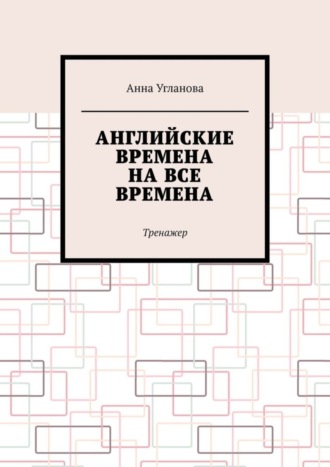
Полная версия
Английские времена на все времена. Тренажер
Special questions
Специальные вопросы.
Начинаются со специальных вопросительных слов
(Где? Куда? Когда? Почему? и т.д.).
QUESTION WORD + AM/IS/ARE + ☺ + V-ing?
23. Look at the example and write the questions.
We are having an English class. What class are you having?
1. He is going to work.Where ____________________________________________________________?2. She is reading a book.What _____________________________________________________________?3. They are waiting for him.Who __________________________________________________________ for?Alternative questions
Альтернативные вопросы с or.
AM/IS/ARE + ☺ + V-ing or V-ing?
AM/IS/ARE + ☺ or ☺ + V-ing?
24. Look at the example and write the questions.
We are having an English class.
Are you having an English or a French class?
1. He is going to work.___________________________________________________________________?2. She is reading a book.___________________________________________________________________?3. They are waiting for their friend.___________________________________________________________________?Disjunctive questions
Разделительные вопросы с «хвостиком – не так ли?»
☺+AM/IS/ARE+V-ing, isn’t/aren’t+☺ (pers. pron.)?
☺+`M NOT/ISN’T/AREN’T+V-ing, am/is/are+pers. pron.?
25. Look at the example and write the questions.
We are having an English class.
We are having an English class, aren’t we?
1. He is going to work.___________________________________________________________________?2. Karen isn’t reading a book.___________________________________________________________________?3. They are waiting for her.___________________________________________________________________?26. Translate into English.
1. Кого вы ждёте?____________________________________________________________________2. Что вы переводите?____________________________________________________________________3. Что вы пишете?____________________________________________________________________4. Что вы сейчас здесь делаете?____________________________________________________________________5. Какую книгу вы сейчас читаете?________________________________________________________________________________________________________________________________________6. Что на вас сегодня надето?____________________________________________________________________7. Какое упражнение вы сейчас выполняете?________________________________________________________________________________________________________________________________________8. Куда вы идёте?____________________________________________________________________9. У вас сейчас урок английского языка?________________________________________________________________________________________________________________________________________10. Смотрите ли вы сейчас телевизор?________________________________________________________________________________________________________________________________________PRESENT PERFECT CONTINUOUS – QUESTIONS
General questions
Общие вопросы. Требуют ответов «да» или «нет».
HAVE/HAS + ☺ + BEEN + V-ing?
27. Look at the example and write the questions.
We have been studying English for a year.
Have you been studying English for a year?
1. He has been working here for 3 months.___________________________________________________________________?2. She has been reading this book since Monday.___________________________________________________________________?3. They have been waiting for him since 6 o’clock.___________________________________________________________________?Special questions
Специальные вопросы.
Начинаются со специальных вопросительных слов
(Где? Куда? Когда? Почему? и т.д.).
SPECIAL QUESTION WORD + HAVE/HAS + ☺ + BEEN + V-ing?
28. Look at the example and write the questions.
We have been studying English for a year.
How long have you been studying English?
1. He has been working here for 3 months.How long ________________________________________________________?2. She has been reading this book since Monday.What _____________________________________________________________?3. They have been waiting for him.Who __________________________________________________________ for?Alternative questions
Альтернативные вопросы с or.
HAVE/HAS + ☺ + BEEN + V-ing or V-ing?
HAVE/HAS + ☺ or ☺ + BEEN + V-ing?
29. Look at the example and write the questions.
We have been studying English for a year.
Have you been studying English or French for a year?
1. He has been working here for 3 months.__________________________________________________________________?2. She has been reading this book since Monday.___________________________________________________________________?3. They have been waiting for their friend.___________________________________________________________________?Disjunctive questions
Разделительные вопросы с «хвостиком – не так ли? правда?».
☺ + HAVE/HAS + BEEN + V-ing, haven’t/hasn’t + ☺ (pers. pron.)?
☺ + HAVEN’T/HASN’T + BEEN + V-ing, have/has + ☺ (pers. pron.)?
30. Look at the example and write the questions.
We have been studying English for a year.
We have been studying English for a year, haven’t we?
1. He has been working here for 3 months.___________________________________________________________________?2. Karen hasn’t been reading this book since Monday.___________________________________________________________________?3. They have been waiting for her since 6 o’clock.___________________________________________________________________?31. Translate into English.
1. Как давно вы ждёте своего друга?______________________________________________________________________________________________________________________________________2. Вы давно изучаете английский язык?______________________________________________________________________________________________________________________________________3. Как долго вы живёте здесь?______________________________________________________________________________________________________________________________________4. Сколько времени вы вяжете эти носки?_________________________________________________________________________________________________________________________________________________________________________________________________________5. Вы пишете эту картину уже несколько месяцев?_________________________________________________________________________________________________________________________________________________________________________________________________________6. Как долго он говорит с ней?______________________________________________________________________________________________________________________________________32. Make up the sentences.
1. English? / Do / they / study___________________________________________________________________2. after / do / does / she / What / breakfast?___________________________________________________________________3. three / Have / they / learning / English / four years? /for / or / been___________________________________________________________________4. a / giving / lecture / She / is / she? / tonight /, isn’t___________________________________________________________________33. Translate this dialogue.
A: Что вы здесь делаете?___________________________________________________________________В: Я жду своего преподавателя.___________________________________________________________________А: Как долго вы его здесь ждёте?___________________________________________________________________В: Я жду его 10 минут.___________________________________________________________________А: Вы часто ждете его?___________________________________________________________________В: Нет, обычно он приходит вовремя.___________________________________________________________________REVISION 1
34. Answer these questions.
Use the verbs: paint – knit – type – go shopping
What does she usually do?She usually sleeps.1. __________________________________________________________________2. __________________________________________________________________3. __________________________________________________________________4. __________________________________________________________________What is she doing now?She is sleeping.5. __________________________________________________________________6. __________________________________________________________________7. __________________________________________________________________8. __________________________________________________________________What has she been doing for a long time?She has been sleeping.9. __________________________________________________________________10. _________________________________________________________________11. _________________________________________________________________12. _________________________________________________________________
35. Write your own sentences using Present Simple, Present Continuous and Present Perfect Continuous, 3 sentences each.
____________________________________________________________________________________________________________________________________________________________________________________________________________________________________________________________________________________________________________________________________________________________________________________________________________________________________________________________________________________________________________________________________________________________________________________________________________________________________36. Choose the correct tense for the verb. Present Simple (S) or Present Continuous (C)? Don’t translate these sentences.
1– Куда ты идешь? _____________– Я иду на джазовый концерт. _____________– Ты любишь джаз? ______________– Да, хотя предпочитаю рок. _____________2– Алло, привет, что делаешь? _____________– Привет! Я иду с женой в кино. ______________– Вы часто ходите в кино? _______________– Нет. Большую часть времени мы смотрим фильмы дома. ______________37. Fill in with Present Simple or Continuous.
Eva: What _______________________________________ (you, do) now?Sam: I ________________________________ (look) through these old magazines. Look, here are old picture of famous actors.Eva: Oh, I ________________ (think) this actor ____________________ (look) awful! And his suit ___________________________ (not, fit) him properly.Sam: Yes, I ________________ (agree). And he ______________ (seem) to be really angry. I wonder what he __________________________ (think) about.Eva: He __________ (be) in that new films that’s on at the cinema now, isn’t he?Sam: Yes, I saw it last night.Eva: I ____________ (hope) it’s a good film. I _______________________ (see) it tonight. Mark ____________________ (take) me. Actually, he __________ (be) very nice to me these days.Sam: He probably _______________ (want) to borrow some money.Eva: I __________________ (see) That explains it.38. Answer the questions.
1) Where do you study?____________________________________________________________________2) How long have you been studying there?____________________________________________________________________3) Where do you live?____________________________________________________________________4) What are doing now?____________________________________________________________________5) What are you wearing now?____________________________________________________________________6) How long have you been learning English?____________________________________________________________________39. Write the essay about your English classes. Don’t forget to use Present Simple, Present Continuous and Present Perfect Continuous.
These expressions can help you: to read the texts, to ask and answer questions, to learn new English words, to listen to the teacher, to watch videos, to translate from Russian into English, to write tests, etc.
At the English Lesson________________________________________________________________________________________________________________________________________________________________________________________________________________________________________________________________________________________________________________________________________________________________________________________________________________________________________________________________________________________________________________________________________________________________________________________________________________________________________________________________________________________________________________________________________________________________________________________________________________________________________________QUIZ 1
1) I am translating an article.a. right now b. for two daysc. every day2) I translate articles.a. since morningb. nowc. every week3) I have been translating an article.a. every dayb. nowc. since two o’clock4) ’to be V-ing’ – is a form ofa. Continuousb. Perfect Continuous5) ’to have been V-ing’ – is a form ofa. Continuousb. Perfect Continuous6) reada. читаю (вообще)b. читаю (уже час, с 11 часов)c. читаю (сейчас)7) am readinga. читаю (вообще)b. читаю (уже час, с 11 часов)c. читаю (сейчас)8) have been readinga. читаю (вообще)b. читаю (уже час, с 11 часов)c. читаю (сейчас)9). Я учусь в университете с сентября.a. studyb. am studyingc. have been studying10) На доске мы пишем мелом.a. writeb. are writingc. have been writing11) Тихо! Студенты пишут тест!a. writeb. have been writingc. are writing12) My sister and all other students are in the university now. They… a test.a. dob. are doingc. have been doing13). The test started four hours ago. They… it for four hours.a. dob. are doingc. have been doing14) My parents are at the station. They… for a train.a. waitb. are waitingc. have been waiting15) My parents… for a train for half an hour.a. waitb. are waitingc. have been waiting16) How long… you… learning English?a. do… beb. have… beenc. is… been17) What… you doing now?a. areb. have beenc. had18) I… writing a test.a. amb. havec. had19) I… writing a test for ten minutes.a. amb. have beenc. had20) Where… you live?a. dob. arec. haveКритерии оценивания работы:
19—20 правильных ответов: 5
17—18 правильных ответов: 4
15—16 правильных ответов: 3
> 15 правильных ответов: стоит снова повторить пройденный материал

UNIT 3
Past Simple
Present Perfect
Look and compare.

Она ТОЛЬКО ЧТО связала свитер.
She has JUST knit the sweater.

Она связала свитер ВЧЕРА.
She knit the sweater YESTERDAY.
41. Match the sentences to their meanings.
1. He has painted the picture.2. He painted the picture.a. вчера, год назадb. только что, уже________________________________________________________________________________________________________________________________________________________________________________________________________________________________________________________________________________REGULAR AND IRREGULAR VERBS
Все английские глаголы делятся на две категории – правильные глаголы (Regular Verbs) и неправильные глаголы (Irregular Verbs).
Правильные глаголы образуют формы Past Simple (Прошедшее простое) и Past Participle3. Для этого просто добавьте к глаголу окончание -ed.
work – worked, jump – jumped
Если глагол оканчивается на -e, то мы добавляем только -d.
move – moved, like – liked
Если глагол оканчивается на согласную+y, то y меняется на i + -ed.
try – tried, carry – carried
НО! Если перед -y гласная, то ничего не меняется, просто добавляем -ed.
play – played, enjoy – enjoyed
В односложных глаголах4, оканчивающихся на гласную + согласную, конечная согласная дублируется.
stop – stopped, plan – planned
41. Write the Past Simple and Past Participle forms of the verbs.
look – __________________ – ___________________listen – __________________ – __________________stop – __________________ – ___________________like – __________________ – ____________________turn – __________________ – ___________________cry – __________________ – ____________________snow – __________________ – __________________kiss – __________________ – ____________________stay – __________________ – ____________________ask – __________________ – _____________________wash – __________________ – ___________________study – __________________ – ___________________hate – __________________ – ____________________rain – __________________ – _____________________follow – __________________ – ___________________В английском языке насчитывают около 470 неправильных глаголов, 200 из которых часто употребляются в повседневной речи. Условно мы можем разделить их на несколько категорий:
Глаголы, которые имеют одинаковую форму инфинитива, форму Past Simple и Past Participle:
hit – hit – hit,
let – let – let,
put – put – put
Глаголы, которые имеют одинаковую форму Past Simple и Past Participle:
bring – brought – brought, feel – felt – felt, have – had – had
Глаголы, которые имеют одинаковую форму инфинитива и форму Past Participle:
come – came – come, run – ran – run, become – became – become
Глаголы, у которых отличается и инфинитив, и форма Past Simple, и форма Past Participle:
drink – drank – drunk, do – did – done, go – went – gone.
Существует специальная таблица неправильных глаголов. Вы можете ее найти в любом справочнике, в том числе и в конце данного пособия.
42. Write the Past Simple and Past Participle forms of the verbs.
begin – __________________- __________________put – __________________- ____________________cut – __________________- ____________________go – __________________- _____________________come – __________________- __________________hear – __________________- ___________________fly – __________________- _____________________shut – __________________- ___________________have – __________________- ___________________win – __________________- ____________________read – __________________- ___________________write – __________________- __________________take – __________________- ___________________give – __________________- ___________________show – __________________- __________________break – __________________- __________________get – __________________- ____________________Конец ознакомительного фрагмента.
Текст предоставлен ООО «ЛитРес».
Прочитайте эту книгу целиком, купив полную легальную версию на ЛитРес.
Безопасно оплатить книгу можно банковской картой Visa, MasterCard, Maestro, со счета мобильного телефона, с платежного терминала, в салоне МТС или Связной, через PayPal, WebMoney, Яндекс.Деньги, QIWI Кошелек, бонусными картами или другим удобным Вам способом.
Примечания
1
Инфинитив – это начальная форма глагола, отвечающая на вопрос что делать? и часто употребляющаяся с частицей to.
2
American English spelling is traveling
3
причастие прошедшего времени, например, сделавший, сделанный
4
в глаголах, состоящих из одного слога (cut, dig etc.)

